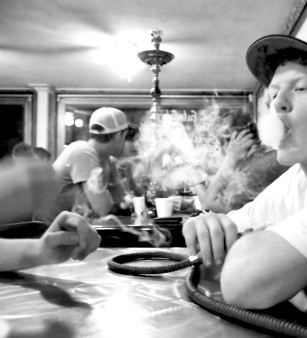Hookah is popular, but still unhealthy
As hookah smoking becomes more and more popular, a greater number of hookah bars are popping up all over Long Island. But some places see them as a nuisance, and municipalities are starting to ban the smoking lounges.
Hookah is a type of Middle Eastern water pipe through which people smoke flavored tobacco called shisha. Hot coals are placed above the shisha, which provides the heat, and the smoke is filtered through water before inhalation.
The smoking of hookah has gained increased popularity in recent years, especially with older high school and college students, one of the main reasons being the social aspect of hookah smoking — hookah is smoked in groups, with the hose being passed around. Hookah bars also give people in the 18-21 range a place to go and socialize that isn’t a traditional bar.
Because the smoke is filtered through water, many people believe that hookah smoking is not as bad as smoking cigarettes. But that is not the case.
“It’s a health issue for the workers at hookah bars, and it’s a health issue for the people partaking in it,” said Susan Kennedy, director of the Tobacco Action Coalition of Long Island, a partner of the American Lung Association. “One smoking session with a hookah is about the same nicotine as 10 cigarettes.”
According to the Center for Disease Control, a person can inhale about 200 puffs of smoke during typical hookah smoking session, compared to about 20 puffs of a cigarette. People also typically inhale almost 200 times as much smoke: 90,000 milliliters of smoke from a hookah compared to about 500 from a cigarette.
“The other thing we have concerns about is, through our interviews and talking to people, a lot of college and high school kids don’t think they’re smoking tobacco,” Kennedy said. “They didn’t think shisha is tobacco.”
Hookah smoke also contains toxic substances that cigarettes don’t. Because the heat source for the hookah are coals, users also inhale chemicals from that, including carbon monoxide and metals. The second-hand hookah smoke also contains many of the same toxins.
It’s because of these many health concerns that municipalities on Long Island have started banning hookah bars. The City of Glen Cove passed a ban on hookah bars in July, and the Village of Rockville Centre is currently discussing a similar ban. The Town of Hempstead recently denied zoning for a hookah bar in West Hempstead.
“Some communities have gotten very concerned, especially ones that are working on teen and college student health issues,” said Kennedy. “This, like e-cigarettes, is becoming a dangerous trend.”

 45.0°,
Mostly Cloudy
45.0°,
Mostly Cloudy 




